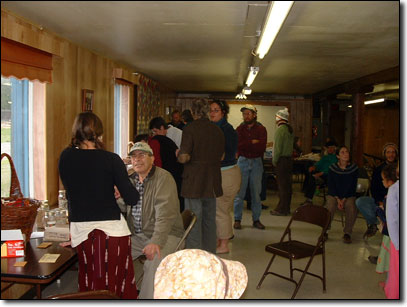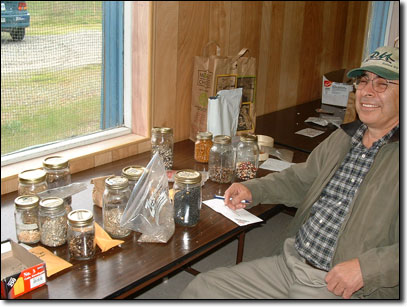|
Williams, Oregon Seed Swap
a Growing Success
by
Lindsay A. Gerken
© Copyright 2006, From The Wilderness Publications, www.fromthewilderness.com. All Rights Reserved. This story may NOT be posted on any Internet web site without express written permission. Contact admin@copvcia.com. May be circulated, distributed or transmitted for non-profit purposes only.
April 7, 2006 1000 PST (FTW) - ASHLAND -Twice a year, the length of the day and night are exactly equal, and everyone on Earth has a twelve-hour day. These days are the annual spring and fall equinox, and in old planting rituals, they signaled to farmers when to plant in the spring, and when to harvest in fall. Falling on or around March 21st, the Spring Equinox is a time of renewal and rebirth that signals the coming of Easter, with the rabbit epitomizing fertility. Nine years ago, in the small, “Eco-topia” of Williams, Oregon, Don and Kimberly Tipping celebrated their marriage on the spring equinox at their nearly ten-acre, Seven Seeds Farm in the flourishing Applegate Valley.
For the next eight years following their marriage, Don and Kimberly held a seed swap at their farm around the time of the equinox in order to honor not themselves, but the four elements of earth, water, wind, and fire that bring such bounty to the natural world.  This gathering of local people included a potluck dinner of various food blessings grown in the area, while everyone attending would sit in a circle and name the one seed or food crop item that they needed, and the one(s) that they had to give. In this way, Don and Kimberly’s annual equinox ritual grew into an activity that honored a sense of community created by a localized mechanism of exchange. Even in years when 50 to 125 people arrived at Seven Seeds Farm, everyone’s story was told, because as Don would say, “Seeds always come with stories.” This gathering of local people included a potluck dinner of various food blessings grown in the area, while everyone attending would sit in a circle and name the one seed or food crop item that they needed, and the one(s) that they had to give. In this way, Don and Kimberly’s annual equinox ritual grew into an activity that honored a sense of community created by a localized mechanism of exchange. Even in years when 50 to 125 people arrived at Seven Seeds Farm, everyone’s story was told, because as Don would say, “Seeds always come with stories.”
For the first time in eight years, the Tipping’s annual seed swap, held on Sunday, April 2nd, was moved from their farm to the Williams Grange in the heart of downtown, and was sponsored by the Williams Sustainability Network. This change of venue brought a new flock of faces to mingle with the many long-time attendees. Residents of Williams and surrounding areas who had recently moved there mingled with their new neighbors and exchanged ideas about farming techniques. Don noticed that many more young people came to this year’s event, including a former farm employee of Don’s, a young lady named Aurora, who headed a “peace table” that was taking donations for her local school’s Peace Club trip. From the woman who raises goats and now wants to work with the Tippings exchanging goat milk and cheeses, to the man who has a corn-breeding program that he sought feedback for, there were around thirty or more knowledgeable people attending this year’s seed swap who shared their farming practices directly with each other in a warm, welcoming environment.
The Williams community that came together included a diverse mixture of experienced farmers, rookies looking to get started, families with young children, teenagers, educators, and elders. Exchanging seeds amongst themselves through verbal bartering, the people’s momentum during the seed swapping took on a life of its own, with barterers standing around talking over tables abundant with seeds, sustenance, and a sustainable spirit. Mason jars, reused plastic ware, and cloth satchels filled with countless seeds adorned the tables inside the Grange, and included many more seed types than this small list contains: coriander, cilantro, rainbow corn, gaucho dry beans, sweet corn, slogun crisphead lettuce, mizuna mustard, black forest kabucha squash, black jet soybeans, purple plum radishes, painted mountain sweet corn, trombone squash, spinach, dried peppers, maize, Chinese cabbage, bok choi, artichoke, oyster mushroom spores, plums, broccoli, Russian red kale, and much, much, more.

One of the most exemplary cases of a family that’s recently made a move from consumerism to sustainability is the family of Jeff and Cynthia Mak, recent arrivals to Williams. Jeff Mak was working at a café in the city of Sherman Oaks, California in 2004 where, interestingly enough, FTW’s headquarters was located before this year. After talking with oil experts, reading Ruppert’s Crossing The Rubicon: The Decline of the American Empire at the End of the Age of Oil, and watching films such as The End of Suburbia, Jeff began to deeply consider what effects Peak Oil would have on his overpopulated Southern California community and on his country. Realizing the economic impacts Peak Oil would have, and finally ceasing to debate with himself about whether Peak Oil is actually a reality, Jeff decided to cash-out his equities, sell the family home, and go north. The mental shift that Jeff and Cynthia had to make in order to take their big leap can be summed up in Jeff’s statement that once someone gets the real facts on Peak Oil and its implications, “you just get it.” Packing their personal belongings into an RV, Jeff and Cynthia Mak and their children, Alexander (age nine) and Samantha (age six), lived and traveled for four months in their silver home while honing-in on their final landing pad. After searching through Northern California, the Maks soon learned of a house in Williams, Oregon that had a barn and twenty acres of land to work with, and they finally knew that they’d finally found “home” in the real sense of the word.
Beginning in January 2005, Jeff and his family tilled an eighth of an acre of land just behind the house for their own family farming, started organizing a greenhouse, and bought goats and chickens that now live in their barn. The Mak family is making a whole-hearted attempt at trying to grow and raise all of their own produce and meats. Jeff realizes that when beginning a new, sustainable farming project, there is a learning curve that must be overcome. In 2005, the Mak family grew half of their own produce, and in 2006 they intend to grow one-hundred percent of their own produce. Assuming that the Mak family is having success with their animals, including future purchases of sheep and pigs, they would like to incorporate their animals into the sustainability of their home farming. Jeff looks forward to planting feed for the livestock, using chicken manure as fertilizer, and harvesting their own meats. With a bright smile and eyes all-a-glow with rejuvenated health and happiness, Jeff describes his family’s new sustainable sanctuary as “1875 with Internet.”
The Mak family has experienced a plethora of emotions through their move to sustainable living, including both an element of the sublime because they’re doing things for themselves they’ve never done, but also moments of mental grieving for those loved-ones they left behind to suffer in the crash of a Peak Oil economy. Though much of the Mak’s extended family considers their move to be strange, Jeff and Cynthia know that the changes happening to them are a step in the right direction— plus their pantry is full of stocked seeds and bulk goods. Instead of thinking only about their own family, the Maks appreciate being a part of the entire Williams community that shares the responsibilities of feeding the neighborhood well into future generations. Hence, the seed swap, where Jeff networked with his fellow Williams residents till dusk.
Jeff Mak and Don Tipping have not only sustainable farming in common, but they are both FTW subscribers who have been following intelligent media on Peak Oil for years. Like the Mak family, (but on a much more advanced scale) Don and Kimberly Tipping grow their own food, and have the added advantage of also earning their income by selling seeds. Companies that support family farms such as the Tipping’s buy seeds in bulk and distribute them throughout the US. So it becomes clear even for the local Oregon farmer who sells seeds to distributors that a decrease in shipping due to high oil prices may affect their income, but they’ll also have no worries about putting food on the table. With sheep, ducks, and geese being raised on the Tipping’s farm, and with the amount of food they produce on their ten acres, Don, Kimberly, and their three-and-a half year-old son Walli will fare bountifully for many years to come.
Next year, the Williams Seed Swap will occur again at the Williams Grange, and will most likely occur closer to the spring equinox. To be sure, baskets-full of various seeds will be bartered on and a potluck dinner filled with tantalizing dishes will ensue. Activities for the children next year will emphasize the joy of spring and may even include the hiding of some local chicken and goose eggs.
Let us not forget though during our equinoxal merriment that such sustainable farming practices and bartering among local communities is not only a healthy and economically beneficial activity, it is also a practice that is becoming a necessity as oil reserves deplete and getting grocery-store pineapples from Hawaii is no longer an option.

Please Note
This function has been disabled.
|
|
|
|



